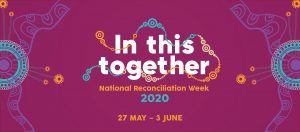In Australia every year, 27 May marks the beginning of Reconciliation Week. It acknowledges the injustice that colonisation and past discriminatory polices have exacted on Aboriginal and Torres Strait Islander (ATSI) peoples and recognises that this continues to adversely shape their material conditions and life chances. It also commemorates significant milestones towards reconciliation and aims to further strengthen relationships and build bridges. Reconciliation Week happens to coincide with the Orthodox liturgical season known as the Pentecostarion, which marks the fifty days between Easter and Pentecost. The overall theme of this liturgical season is the advent of a new creation through Christ’s resurrection, which brings within us renewal, illumination, and a rebirth in the Spirit. It is for this reason that the Gospel of John, steeped in watery imagery, is read in its entirety. In this reflection I compare the water imagery, so prominent in this festal season, with dadrri, a contemplative spiritual practice found among the Ngan’gikurunggurr and Ngen’giwumirri languages of the Aboriginal peoples of the Daly River region in the Northern Territory. The practice was first introduced to the Australian English-speaking community by Miriam Rose Ungunmerr-Baumann, an ATSI Christian woman, activist, and educator.
On the first Sunday after Pascha, we hear Christ say to the Apostle Thomas, “reach your hand here and put it into my side.” We are starkly reminded of the piercing of Christ’s side and the immediate flow of water and blood, a symbol of our new life in Christ through the sacraments of Baptism and Eucharist. The water symbolism comes to a climax on the fourth Sunday of Pascha with Christ’s lengthy conversation with the Samaritan woman at Jacob’s well. He proclaims, “those who drink of the water I shall give them will never thirst,” and “God is Spirit, and those who worship him must worship in Spirit and Truth.” The following Matins hymn for the feast of Mid-Pentecost connects the two great feasts: “Since we have learned from Christ a new and unprecedent way of life, let us all be especially diligent to preserve it until the end, that we may enjoy the presence of the Holy Spirit.”
During these fifty days we follow Christ as he befriends the outcasts, the stranger, the diseased, and those perceived as unclean. He rebukes leaders, and even his own disciples, for their hypocrisy and legalism. We are shown that to be born anew, we must listen to the Spirit inside us. This requires us to undergo continually our own inner spiritual examination and confront the fears, doubts, and prejudicial attitudes that separate us from God and each other.
In the extract below, Mariam Rose explains how Dadirri can become a roadmap to reconciliation. (I encourage you to read her text in its entirety, here). Like the Gospel message found in the Pentecostarian season, Dadirri involves a deep and respectful listening to the natural world, each other, and most importantly the spiritual side within us:
Dadirri recognises the deep spring that is inside us. We call on it and it calls to us. This is the gift that Australia is thirsting for. It is something like what you call “contemplation.”
…Our Aboriginal culture has taught us to be still and to wait. We do not try to hurry things up. We let them follow their natural course — like the seasons. We watch the moon in each of its phases. We wait for the rain to fill our rivers and water the thirsty earth…
…We are River people. We cannot hurry the river. We have to move with its current and understand its ways.
We hope that the people of Australia will wait. Not so much waiting for us — to catch up — but waiting with us, as we find our pace in this world.
…My people are used to the struggle, and the long waiting. We still wait for the white people to understand us better. We ourselves had to spend many years learning about the white man’s ways. Some of the learning was forced; but in many cases people tried hard over a long time, to learn the new ways.
We have learned to speak the white man’s language. We have listened to what he had to say. This learning and listening should go both ways. We would like people in Australia to take time to listen to us. We are hoping people will come closer. We keep on longing for the things that we have always hoped for — respect and understanding…
…There are deep springs within each of us. Within this deep spring, which is the very Spirit of God, is a sound. The sound of Deep calling to Deep. The sound is the word of God — Jesus.
Today, I am beginning to hear the Gospel at the very level of my identity. I am beginning to feel the great need we have of Jesus — to protect and strengthen our identity; and to make us whole and new again.
“The time for re-birth is now,” said the Holy Father to us. Jesus comes to fulfil, not to destroy.
If our culture is alive and strong and respected, it will grow. It will not die.
And our spirit will not die.
And I believe that the spirit of dadirri that we have to offer will blossom and grow, not just within ourselves, but in our whole nation.
Acknowledgment
Originally posted to the Facebook page of Saint Gregory the Theologian’s Orthodox Mission
31 May 2019 © AIOCS

